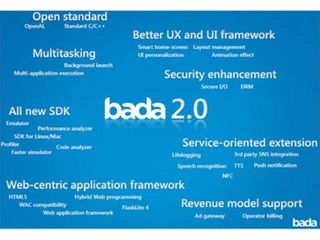Samsung to merge bada with Tizen
Planning new OS to take on heavyweights

Samsung is looking to expand its reach in the smartphone market by joining the forces of its Bada operating system with Tizen's open source offering.
Bada, launched in 2010, is Samsung's attempt to create a new mobile phone OS. It focussed on getting their non-smartphone users onto new devices, at an affordable price - but not to compete with the likes of iOS, Android and Windows Phone primarily.
To add more beef to the bada project Samsung are now merging it with Tizen, which originates from a partnership with Intel and takes pieces from the doomed MeeGo system. Both will run the same SDK and developers will be happy to hear that the same APIs will be supported.
Shake it up and stand back
This gives the new merger a wide platform of developers to work with, with experts from MeeGo, Bada and Tizen all being able to contribute to the end product. With the open source nature of the deal, it should lead to a decent number of apps being produced to back up the smartphones they will be running on.
It is thought that Samsung will still keep the two systems separate, with Bada to appear on low-end phones, where low cost is important and Tizen featuring on the higher end of the market, on more advanced smartphones.
It looks like Samsung will be launching at least one Tizen handset in 2012, with the leaking of the I9500 an early contender.
Get daily insight, inspiration and deals in your inbox
Get the hottest deals available in your inbox plus news, reviews, opinion, analysis and more from the TechRadar team.

John joined TechRadar over a decade ago as Staff Writer for Phones, and over the years has built up a vast knowledge of the tech industry. He's interviewed CEOs from some of the world's biggest tech firms, visited their HQs and has appeared on live TV and radio, including Sky News, BBC News, BBC World News, Al Jazeera, LBC and BBC Radio 4. Originally specializing in phones, tablets and wearables, John is now TechRadar's resident automotive expert, reviewing the latest and greatest EVs and PHEVs on the market. John also looks after the day-to-day running of the site.
